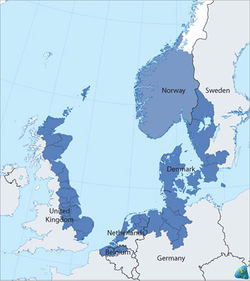Updating NorVision - Towards a New Spatial Agenda for the North Sea Region
The 7 countries around the North Sea Region (NSR) are working together in the INTERREG IIIB North Sea Programme to solve shared problems related to marine spatial development. Partnerships receive EU funds to work on such projects and thus encourage transnationality which in turn, allows partners to share knowledge, money and opportunities for improving the quality of life for everyone in the North Sea Region.
Introduction
Between 1998 and 2001, a spatial vision for the North Sea Region was developed, based on the principles of the European Spatial Development Perspective (ESDP)(NSR Spatial Vision Working Group, 2000) [1]. NorVision, as it was called, is a key advisory document, which has strongly influenced territorial cooperation in the North Sea Region. It describes the existing state of spatial development and suggests directions for the future.
In recent years, the NSR felt there should be an update to NorVision for several reasons such as the expansion of the EU, new developments in EU policy and increased marine spatial claims. Thus the aim of the project on which this article is based, was to update the Vision document with particular focus on the new policy theme Coastal Water Management (CWM). Atkins were commissioned by Resource Analysis Consult NV in 2005 to carry out an update on England and Scotland only.
Methodology
In order to identify the most urgent and relevant challenges regarding CWM, targeted desk research screening relevant policy documents, projects and investment plants was conducted. Workshops and questionnaires were also carried out between the end of March and the beginning of May 2005 in England and Scotland to address such challenges.
Various themes were addressed:
- Identifying relevant CWM issues;
- Assessing the benefits of CWM for trans-national cooperation;
- Identifying potential solutions to deliver better CWM;
- Identifying potential CWM partners and their expected willingness to cooperate.
Results
A brief summary of the main findings for England and Scotland can be found below.
Main marine spatial challenges in the NSR In summary, challenges included managing the sea’s resources, different governing bodies and legislation, marine ecosystem management, climate change, managing the use / development of the sea and a general lack of knowledge or funds.
Degree of knowledge of the issues by key players in the field The degree of knowledge was considered to be poor to variable due to compartmentalisation of issues into sectors.
Degree of coverage of these issues by existing policies and plans This was thought to be poor to variable, for example, there are too many regulations dealing with coastal water consents and no legal requirements to consider their implementation.
The extent that transnational cooperation could meet these challenges It was considered that most challenges can be met through transnational cooperation, for example, the exchange of experience and knowledge on local solutions and also on future Interreg programmes.
Those who would benefit from transnational cooperation Of those consulted, it was thought that all stakeholders, for instance governments, fishermen, the tourism industry, research institutes, NGOs etc. would benefit.
Activities or investments that would be valuable to undertake The main themes that emerged include collation and integration of available data with common data and acquirement standards, increasing awareness, effective risk management and learning from examples and case studies[2].
Conclusions
National, regional and local institutions all have a role in marine spatial planning and implementation of integrated coastal management. However, there are many different governing bodies resulting in challenges such as sectoral thinking, conflicts between local, national and international priorities, lack of harmonization of existing EU policies with national policies, and weak communication.
Marine spatial planning would indeed contribute towards improved coastal management by addressing the challenges that face coastal waters in the North Sea Region today. Benefits would include integration of relevant EU legislation, increased stakeholder support and shared knowledge. In turn, human activities on the coast will be regulated, managed and protected whilst addressing potentially conflicting uses of the sea.
References
Please note that others may also have edited the contents of this article.
|
